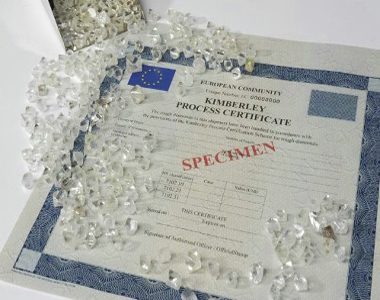CONFLICT DIAMONDS
Conflict diamonds captured the world’s attention during the extremely brutal conflict in Sierra Leone in the late 1990s. During that time, it is estimated that conflict diamonds represented approximately 4% of the world’s diamond production.
While illicit rough diamonds have been used by rebels to fund conflicts across many African countries, the problem is not the diamond itself, but the rebels who exploit diamonds (along with other natural resources) to achieve their illicit goals.
Today the trade in conflict diamonds has been virtually eliminated through the efforts of Kimberly Process participants and from adherence to warranties and monitoring processes as part of the Kimberly Process Certification Scheme.
THE KIMBERLEY PROCESS
Formed in 2000, the KP is a binding agreement among governments, civil society and industry leaders to remove conflict diamonds from the global supply chain.
Membership imposes extensive requirements on every participant including adherence to the Kimberley Process Certification Scheme (KPCS) that both safeguards the shipment of rough diamonds and certifies them as conflict free.
KIMBERLEY PROCESS CERTIFICATION SCHEME

The KPCS was first implemented in 2003. Today 81 governments have included the Kimberley Process Certification System in their national law.
Under the terms of the KPCS, members must:
- Satisfy minimum requirements and establish national legislation, institutions and import/export controls
- Commit to transparent practices and to the exchange of critical statistical data
- Trade only with fellow members who also satisfy the fundamentals of the agreement
- Certify shipments as conflict-free and provide the supporting certification
MONITORING PROCESS
Kimberley Process participants undergo periodic reviews, along with peer monitoring to ensure compliance. Furthermore, all rough diamond sales are independently audited, and are also subject to separate governmental regulations. Any country that is found not to be in compliance can be sanctioned by the Kimberley Process.
SYSTEM OF WARRANTIES
A voluntary system of industry self-regulation, the System of Warranties requires all buyers and sellers of rough diamonds, polished diamonds and jewelry containing diamonds make the following affirmative statement on all invoices:
“The diamonds herein invoiced have been purchased from legitimate sources not involved in funding conflict and in compliance with United Nations resolutions. The seller hereby guarantees that these diamonds are conflict free, based on personal knowledge and/or written guarantees provided by the supplier of these diamonds.”
The Essential Guide to Implementation of the Kimberley Process, published by the Jewelers Vigilance Committee, details additional steps and principles:
In addition, each company trading in rough and polished diamonds is obliged to keep records of the warranty invoices received and the warranty invoices issued when buying or selling diamonds. This flow of warranties in and warranties out must be audited and reconciled on an annual basis by the company’s own auditors. If asked for by a duly authorized government agency, these records must be able to prove that you are in compliance with the Kimberley Process. Additionally, all industry organizations and their members have adopted the following principles of self-regulation:
- to trade only with companies that include warranty declarations on their invoices; to not buy diamonds from suspect sources or unknown suppliers, or which originate in countries that have not implemented the Kimberley Process Certification Scheme
- to not buy diamonds from any sources that, after a legally binding due process system, have been found to have violated government regulations restricting the trade in conflict diamonds
- to not buy diamonds in or from any region that is subject to an advisory by a governmental authority indicating that conflict diamonds are emanating from or available for sale in such region, unless diamonds have been exported from such region in compliance with the Kimberley Process Certification Scheme
- to not knowingly buy or sell or assist others to buy or sell conflict diamonds
- to ensure that all company employees who buy or sell diamonds within the diamond trade are well informed regarding trade resolutions and government regulations restricting the trade in conflict diamonds.
Failure to abide by the aforementioned principles exposes the member to expulsion from industry organizations. Under the terms of the Kimberley Process, it will be considered a violation to issue a warranty declaration on a sales invoice unless it can be corroborated by warranty invoices received for purchases. Failure to adhere to these principles will prompt investigation and could result in expulsion from the various diamond industry institutions.
More information can be found at:

